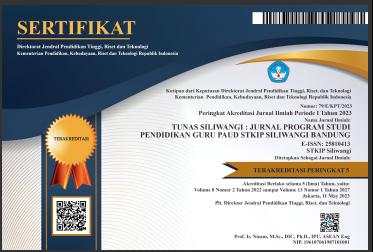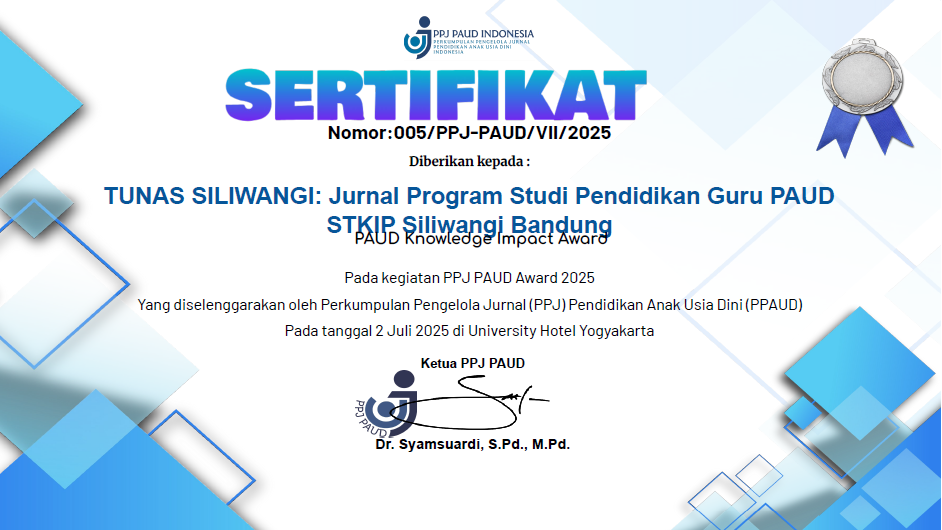Reconceptualization of school readiness: neoliberal paradigm and privatization in early childhood education
DOI:
https://doi.org/10.22460/ts.v10i2.5169Keywords:
Privatization , Neoliberalism, School Readiness , Early Childhood EducationAbstract
Privatization and neoliberalism have significantly impacted educational policies, exacerbating inequalities in access to education, particularly for children from low-socioeconomic backgrounds. This study investigated the effects of these policies on access, quality, and character development at TK Cendani, Bandung. Employing a qualitative case study approach, data were collected through observation and interviews and analyzed using Grounded Theory. The findings revealed a paradoxical interplay between inclusivity and exclusivity within the education system. Children from disadvantaged backgrounds were often denied equitable opportunities, leading to discriminatory practices that hindered their development. Teachers' needs frequently took precedence over students', resulting in an imbalanced teaching and learning environment. Moreover, the proliferation of elite schools accessible only to children from affluent families further exacerbated educational disparities. These results underscore the necessity for a more inclusive educational policy that harmonizes academic achievement with the development of children's character.
References
Ainscow, M. (2020). Promoting inclusion and equity in education: Lessons from international experiences. Nordic Journal of Studies in Educational Policy, 6, 1–10. https://doi.org/10.1080/20020317.2020.1729587
Anderson-Levitt, K. M. (2003a). A World Culture of Schooling? In K. M. Anderson-Levitt (Ed.), Local Meanings, Global Schooling: Anthropology and World Culture Theory (pp. 1–26). Palgrave Macmillan US. https://doi.org/10.1057/9781403980359_1
Anderson-Levitt, K. M. (Ed.). (2003b). Local Meanings, Global Schooling. Palgrave Macmillan US. https://doi.org/10.1057/9781403980359
Apple, M. W. (2006). Understanding and Interrupting Neoliberalism and Neoconservatism in Education. Pedagogies: An International Journal, 1(1), 21–26. https://doi.org/10.1207/s15544818ped0101_4
Ball, S. J. (2007a). Education plc: Understanding private sector participation in public sector education. Routledge.
Ball, S. J. (2007b). Education plc: Understanding private sector participation in public sector education. Routledge.
Ball, S. J. (2012a). Global education inc: New policy networks and the neo-liberal imaginary. Routledge.
Ball, S. J. (2012b). Global education inc: New policy networks and the neo-liberal imaginary. Routledge.
Brown, P., Lauder, H., Ashton, D., Yingje, W., & Vincent-Lancrin, S. (2008a). Education, Globalisation and the Future of the Knowledge Economy. European Educational Research Journal, 7(2), 131–156. https://doi.org/10.2304/eerj.2008.7.2.131
Brown, P., Lauder, H., Ashton, D., Yingje, W., & Vincent-Lancrin, S. (2008b). Education, Globalisation and the Future of the Knowledge Economy. European Educational Research Journal, 7(2), 131–156. https://doi.org/10.2304/eerj.2008.7.2.131
Brown, P., Lauder, H., Ashton, D., Yingje, W., & Vincent-Lancrin, S. (2008c). Education, Globalisation and the Future of the Knowledge Economy. European Educational Research Journal, 7(2), 131–156. https://doi.org/10.2304/eerj.2008.7.2.131
Creswell W. John. (2013). Research Design Pendekatan Kualitatif, Kuantitatif, Dan Mixed. Yogyakarta : Pustaka Pelajar.
Gupta, A. (2014). Diverse Early Childhood Education Policies and Practices: Voices and Images from Five Countries in Asia (1st ed.). Routledge. https://doi.org/10.4324/9780203797846
Harvey, D. (2005b). Neoliberalism ‘with Chinese Characteristics.’ In D. Harvey (Ed.), A Brief History of Neoliberalism (p. 251). Oxford University Press. https://doi.org/10.1093/oso/9780199283262.003.0009
Heyneman, S. (2003). The History and Problems in the Making of Education Policy at the World Bank, 1960-2000. International Journal of Educational Development, 23, 315–337. https://doi.org/10.1016/S0738-0593(02)00053-6
Lamsal, G., & Maharjan, R. (2017). Role of Economic Factors in Promoting Dalit Education. Journal of Advanced Academic Research, 2, 59. https://doi.org/10.3126/jaar.v2i1.16597
Levin, H. M., & Belfield, C. R. (2003). Chapter 6: The Marketplace in Education. Review of Research in Education, 27(1), 183–219. https://doi.org/10.3102/0091732X027001183
Levitt, A. (2003). Local Meanings, Global Schooling: Anthropology and World Culture Theory. https://www.researchgate.net/publication/44835653_Local_Meanings_Global_Schooling_Anthropology_and_World_Culture_Theory
Mistry, A. (2018). Ethnic Politics in Nepal: A Theoretical Outlook.
Mulya, T. W. (2016). Neoliberalism Within Psychology Higher Education in Indonesia: A Critical Analysis. ANIMA Indonesian Psychological Journal, 32(1), Article 1. https://doi.org/10.24123/aipj.v32i1.579
Muttaqin, T. (2018). Determinants of Unequal Access to and Quality of Education in Indonesia. Jurnal Perencanaan Pembangunan: The Indonesian Journal of Development Planning, 2. https://doi.org/10.36574/jpp.v2i1.27
Nganga & Kambutu (2019). A pedagogy of vulnerability: Its relevance to diversity teaching and ‘humanising’ higher education. Retrieved September 5, 2024, from https://www.researchgate.net/publication/371913569_A_pedagogy_of_vulnerability_Its_relevance_to_diversity_teaching_and_'humanising'_higher_education
Nishimura, M., & Yamano, T. (2013). Emerging Private Education in Africa: Determinants of School Choice in Rural Kenya. World Development, 43, 266–275. https://doi.org/10.1016/j.worlddev.2012.10.001
Nsamenang, A. B., & Tchombe, T. M. S. (2011). Handbook of African Educational Theories and Practices.
Resnik, J., Robertson, S., Dale, R., Benavot, A., Cussó, R., Arnove, R., Yonah, Y., Dahan, Y., Lallo, O., Lerner, J., Ben-Ari, E., Naftali, O., & Wexler, P. (2008). The Production of Educational Knowledge in the Global Era. https://doi.org/10.1163/9789087905613
Rizvi, F., & Lingard, B. (2010a). Globalizing education policy. Routledge.
Rizvi, F., & Lingard, B. (2009). Globalizing Education Policy (1st ed.). Routledge. https://doi.org/10.4324/9780203867396
Suzuki, A. (2014). International Education Policy in Japan in an Age of Globalisation and Risk. Jurnal ELT 68(4):482-486. DOI: 10.1093/elt/ccu053
Tabulawa. (2010). International Aid Agencies, Learner-centred Pedagogy and Political Democratisation: A critique: Comparative Education: Vol 39, No 1. https://www.tandfonline.com/doi/abs/10.1080/03050060302559
Verger, A., Fontdevila, C., & Zancajo, A. (2016a). The privatization of education: A political economy of global education reform. Teachers College Press.
Verger, A., Fontdevila, C., & Zancajo, A. (2016b). The privatization of education: A political economy of global education reform. Series: International perspectives on education reform. Teachers College Press: New York, NY. ISBN 9780807757598
Wamalwa, F. (2018). EconPapers: Private schools and student learning achievements in Kenya, vol. 66, issue C,114-124 https://econpapers.repec.org/article/eeeecoedu/v_3a66_3ay_3a2018_3ai_3ac_3ap_3a114-124.htm
Downloads
Published
Issue
Section
License
Copyright (c) 2025 Regita Musfita Regita, Aghnia Farrassyania Azhar, Ratna Dwi Nurcahyani, Diantifani Rizkita

This work is licensed under a Creative Commons Attribution-ShareAlike 4.0 International License.
The author is responsible for acquiring the permission(s) to reproduce any copyrighted figures, tables, data, or text that are being used in the submitted paper. Authors should note that text quotations of more than 250 words from a published or copyrighted work will require grant of permission from the original publisher to reprint. The written permission letter(s) must be submitted together with the manuscript.







